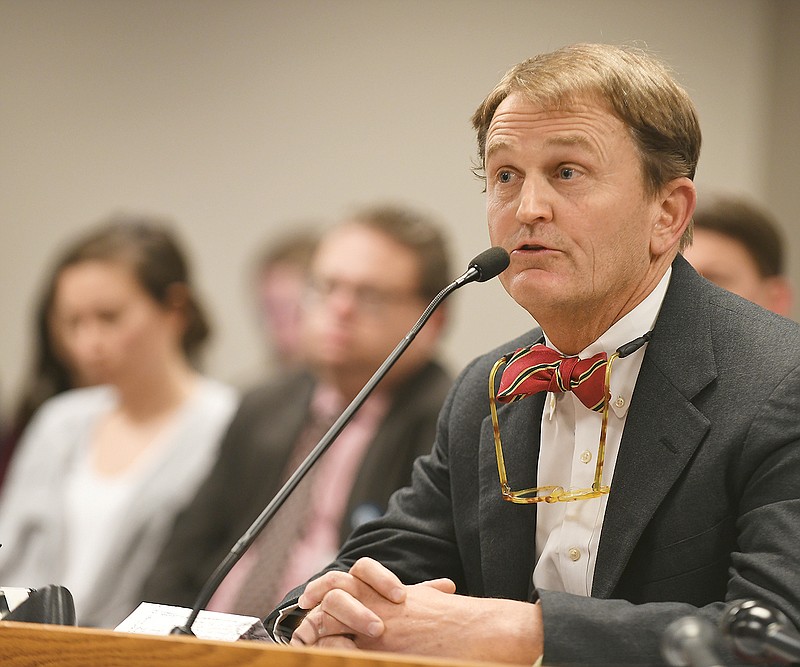This article is free to all readers because it includes information important to public safety and health in our community.
While state health director Dr. Randall Williams told a group of state lawmakers Tuesday he's expecting the first doses of a COVID-19 vaccine from Pfizer to begin arriving in Missouri next month - initially reserved for health care and long-term care home workers - now is not the time for admittedly tired Missourians to stop taking precautions against the coronavirus.
If anything, it's more important than ever to social distance, use hand sanitizer, wear a mask and be cautious about gatherings with people beyond those who live in one's own home, Williams said.
He told the House Special Committee on Disease Control and Prevention on Tuesday the first vials of a COVID-19 vaccine from Pfizer should arrive in four or five weeks, though he could not give a specific date.
The New York-based pharmaceutical company Pfizer Inc. and its German pharmaceutical partner BioNTech have developed a vaccine candidate the Associated Press reported this week may be 90 percent effective, though that's based on early and incomplete test results.
Pfizer's research and development facility in Chesterfield was previously selected as one of three Pfizer-owned sites in the U.S. to be an initial manufacturing center for a vaccine.
Before the pandemic, BioNTech had been using mRNA technology to develop new therapies for cancer and infectious disease, and mRNA technology is the basis of the COVID-19 vaccine the two companies have developed.
Williams explained normally, vaccines introduce a weakened, inactive form of a targeted disease to someone so their body can develop an immune response to it, and that vaccine production process involves animals or eggs - like most flu shots do.
However, the mRNA vaccine does not use the coronavirus itself; instead, it uses genetic code to train someone's immune system to recognize the spiked protein on the surface of the virus, the Associated Press reported.
Pfizer and BioNTech reported the vaccine they've developed has to be given in two doses, and protection against the coronavirus that causes COVID-19 is achieved 28 days after the first dose is given.
Williams' rough timetable for arrival of the first doses in Missouri all depends on whether the U.S. Food and Drug Administration and other authorities even approve the companies' vaccine for use, however.
He said Pfizer expects to submit a request for emergency use authorization within two weeks. Once the FDA receives that EUA, a public and private partnership will look at the safety of the vaccine, and it would probably take another two weeks to approve the EUA.
Within 24 hours of the moment of approval, vaccine doses would begin to be shipped, mostly allocated by states' population size, Williams said. Shipments would continue every week.
Once shipped, people still couldn't actually receive the vaccine until the Centers for Disease Control and Prevention and a vaccine advisory council take a few days to approve the vaccine. If approved, Williams said vaccinations would start immediately.
Missouri's vaccine distribution plan is a three-phase approach that first prioritizes health care workers - especially those with underlying health conditions that put them at higher risk for more serious consequences of a coronavirus infection - and long-term care home workers.
Williams said Pfizer and BioNTech's vaccine has to be stored at -94 degrees Fahrenheit - which can be achieved with dry ice or a specialized freezer - and that means there are only so many places that have storage capacity at that temperature.
He said five sites around the state are preparing to receive the vaccine, and people would have to travel to those sites to receive it.
The state's vaccine distribution plan relies on the eventual availability of a vaccine that does not require ultra-cold storage temperatures that entails those kinds of logistics: "Extended availability of only ultra-cold vaccine could undermine the tiered sequencing currently planned to guarantee equitable vaccine distribution across rural and urban populations," according to the plan.
Williams told the House committee, however, while Pfizer and BioNTech's vaccine could get the state through its first distribution phase, another vaccine candidate may be approved and be incorporated into the second phase - which includes protecting more especially at-risk groups of people and critical workers for the economy - and yet more vaccine candidates may be approved and incorporated into the third phase, which is vaccination of the general public.
The general public may not have access to a vaccine until April or May 2021.
In the meantime, committee Chairman Jonathan Patterson, R-Lees Summit, reminded that infection numbers continue to climb into uncharted territory, averaging 3,500 new cases per day, and there could be a "very dark winter that's coming up."
Williams said this is the time for people to be most alert and cautious, especially as the holidays near - to consider any of the friends someone may go out to dinner with or any of the relatives over for Thanksgiving may have been exposed to the coronavirus.
However, Williams resisted statewide mandates, such as wearing masks, because of the diversity of the state's populations. There's also a risk of people's fatigue of taking precautions becoming worse - though members of the committee also pointed out their feelings to the opposite, and patients from rural areas often get transferred to larger hospitals.
Patterson said people who want a mask mandate see that if counties all take different approaches, "that's not a plan that has a shared goal and shared sacrifice."

